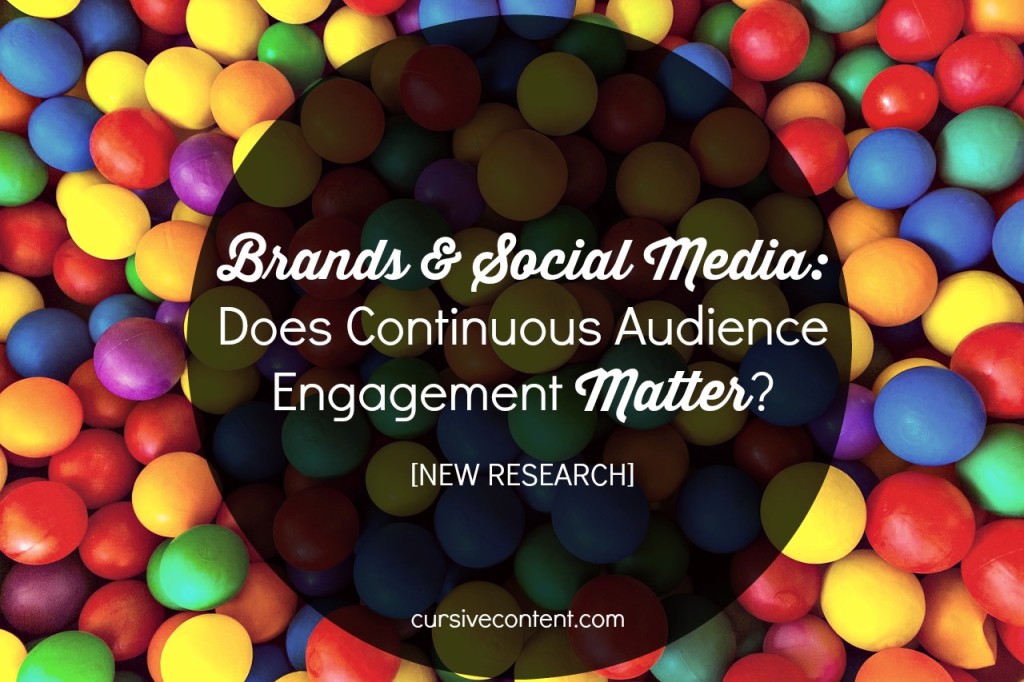Brands & Social Media: Does Continuous Audience Engagement Matter? [NEW RESEARCH]

Should a brand’s goal on social media be good consumer engagement on a continuous basis or great consumer engagement from time to time?
That is the interesting question posed by Convince & Convert’s Jay Baer in his recent article, “New Social Media Research Uncovers the Big Problem for Businesses”.
The question comes out of a review of Hubspot’s Q4 2014 The Social Lifestyle Report, which found that, with social media, consumers expect a LOT from brands … but don’t give much attention or loyalty in return.
For example:
- Consumers expect brands to have a presence on almost 3.5 different social platforms.
- More than 60% of consumers believe brands should be on Twitter, and more than 80% think they should be on Facebook.
- However … consumers only follow brands on 1.5 platforms – and about 35% of consumers follow NO brands on social media.
Baer reflects on the large disconnect between consumer and brand expectations of one another on social media, posing the idea:
“Maybe we need to worry less about sustained exposure and engagement – which this research shows consumers don’t really want anyway – and worry more about crafting social content that it so useful and relevant that it breaks through consumers’ collective disinterest in branded social media?”
So, should brands really be chasing continuous engagement with consumers on social media? And if continuous engagement is not the ultimate goal for brands, should brands devote as much time and resources to social media?
My opinion: Continuous social media presence is just as important as continuous social media engagement.
Consider the consumer who is looking for a hotel in a destination they have never visited. That consumer may check out the hotel’s website and then link through to its social platforms. Once on social, they may want to review other visitor-generated reviews and photos, and also see the types of content the hotel is posting.
In this instance, the consumer may not be interested in continuous brand engagement once their visit is over. However, a robust social presence is critical for that moment of purchase decision.
Why? Continuous social media presence is a consumer gauge for credibility.
Many consumers use social media as a measure of a brand’s legitimacy. As the research reflects, consumers expect brands to be on social media – similar to how consumers began to expect brands to have a website in the 1990s.
The presence alone validates the brand and demonstrates that the brand is up-to-date, active and trustworthy. Take the hotel example above. If the hotel had zero social media presence, the potential visitor might think twice about booking there, because the decision lacks social validation.
Just like with websites of old, if a brand’s social media presence exists but is weak and unprofessional, consumers will take note. Even if consumers don’t want to read all of the content posted, they will sense a brand’s tone and expertise simply by scanning the page. If both quantity and quality are absent, trust decreases.
If that’s not enough, continuous social media presence is also necessary to support that time-to-time breakthrough content.
If brands shift their focus from good engagement on a consistent basis to great engagement from time to time, as Baer suggests, they need to have that established presence as a platform for distribution.
Brands need to create good, consistent content on social media to build a strong platform on which to share breakthrough content. Because breakthrough content is useless if it’s undiscovered.
The bottom line: don’t let low engagement scare you off.
Brands see Facebook’s organic reach dropping to nearly nothing, and are frustrated by this low engagement. But low engagement cannot be used as an excuse to discontinue social media efforts.
Brands need to shift the way they view and measure social media. By understanding consumer expectations, brands may discover that continuous engagement may not be the ultimate goal.
Check out all of Hubspot’s findings in the following SlideShare, and sign up for our eNewsletter below for more tips and advice that will help you create content that increases your online authority and generates new business.
MORE ARTICLES
-
 How to Support Your School Story with Organic, Authentic Social Media
How to Support Your School Story with Organic, Authentic Social Media -
 How to Attract Dream Families with Unforgettable Private School Social Media Advertising
How to Attract Dream Families with Unforgettable Private School Social Media Advertising -
 The Case for School Content Marketing
The Case for School Content Marketing -
 Social Proof: What Is It, and How Can School Marketers Use It?
Social Proof: What Is It, and How Can School Marketers Use It? -
 Conversion Copywriting for Schools: An Introduction
Conversion Copywriting for Schools: An Introduction -
 10 Questions to Help Conquer School Marketing FOMO
10 Questions to Help Conquer School Marketing FOMO -
 You Wrote a School Blog Post— Now What?
You Wrote a School Blog Post— Now What? - 2 NEW Ways to Inspire School Blog Content in 2017
[…] Research shows that your Facebook presence isn’t just significant for your fans—it’s important to potential customers who want to learn more about you. Social networks have become a form of proof that a company is legitimate, smart and on top of their game. […]